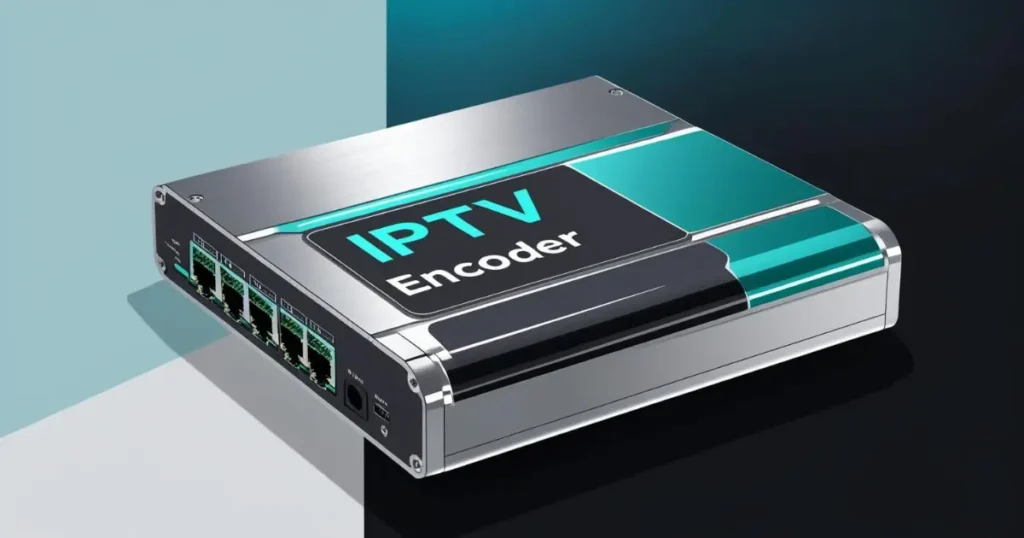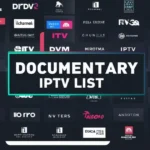In today’s digital world, delivering top-notch video content is crucial. IPTV encoder technology plays a key role in this, linking your video sources to digital platforms. By grasping IPTV encoders’ core functions, you can enhance your live streaming and video distribution.
IPTV encoders are vital in modern video delivery. They compress, encode, and send digital video and audio over IP networks. They support live events, pre-recorded content, and interactive streams, making them essential for your digital video setup.
Key Takeaways
- IPTV encoders are essential for delivering high-quality video content over digital networks.
- They handle the critical tasks of video compression, encoding, and IP-based transmission.
- Understanding the core components and capabilities of IPTV encoders is key to optimizing your video delivery.
- IPTV encoders enable a wide range of live streaming, video-on-demand, and interactive broadcasting applications.
- Choosing the right IPTV encoder for your needs requires considering factors like processing power, network infrastructure, and video compression standards.
Understanding IPTV Encoder Technology
The world of media is changing fast, and IPTV encoders play a key role. These devices turn raw video into compressed digital streams for IP networks. Knowing how they work helps you keep up with media services and give your viewers a great experience.
Core Components of IPTV Encoding Systems
At the heart of IPTV encoding are key parts that work together. They include:
- Video capture devices: These turn analog video into digital formats.
- Encoding software: This compresses digital video, keeping quality high through transcoding.
- Streaming servers: These servers get the encoded video ready for IP networks, ensuring smooth delivery.
How Digital Video Processing Works
Digital video processing in IPTV encoding has several steps. First, raw video is captured and digitized. Then, encoding software compresses it, keeping quality high. This compressed video is sent over IP networks, letting viewers watch through over-the-top media services.
Key Features of Modern Encoders
Today’s IPTV encoders have many advanced features. These include:
- Multi-format support: This lets you encode different video and audio codecs for various platforms.
- Adaptive bitrate streaming: This adjusts video quality based on network conditions, ensuring smooth viewing.
- Integrated analytics: These give real-time insights into how viewers interact with your content.
Understanding IPTV encoders helps you make the most of your media delivery. It ensures a top-notch viewing experience for your audience.
Benefits of Professional IPTV Encoder Solutions
The quality of your IPTV encoder is crucial for streaming video content. Professional-grade encoders offer many advantages. They improve video quality and use bandwidth efficiently. This makes your streaming better.
Professional IPTV encoders deliver top-notch video quality. They use multicast transmission and adaptive bitrate streaming technologies. This ensures your viewers get a smooth, high-definition experience, even on slow networks.
These encoders also save bandwidth. They manage bitrates and adjust to network changes. This lets you stream to more viewers without lowering quality.
| Feature | Benefit |
|---|---|
| Multicast Transmission | Enables efficient distribution of video content to multiple viewers, reducing bandwidth requirements. |
| Adaptive Bitrate Streaming | Adjusts the video quality based on the viewer’s network conditions, ensuring a seamless viewing experience. |
| Advanced Encoding Algorithms | Delivers high-quality video with minimal bandwidth usage, optimizing network resources. |
| Scalable Architecture | Allows for easy expansion and handling of growing viewership, without compromising performance. |
Investing in professional IPTV encoder solutions brings many benefits. It boosts your streaming capabilities and gives viewers a better experience.
Essential Hardware Requirements for IPTV Encoding
Setting up a strong IPTV encoding system needs the right hardware. You’ll need processing power, network setup, and storage. Each part is key for a smooth video experience.
Processing Power Specifications
The CPU is the heart of your IPTV system. Choose a CPU that can handle video processing well. It should have lots of cores and speed for many streams at once. The needs vary by video quality, bitrate, and channel number.
Network Infrastructure Needs
Your network is crucial for IPTV. It must be fast and reliable for video streaming. Make sure it has enough speed for your viewers. Use special network switches and prioritize traffic for better performance.
Storage Considerations
- Think about how much storage you need based on video quality, how long you keep it, and channel count.
- Choose high-capacity, fast storage like enterprise SSDs or NAS for smooth playback.
- Have a good backup plan to protect your videos and avoid losing data.
By focusing on these hardware needs, you can create a top-notch IPTV encoding system. It will meet your video needs with ease and dependability.
Video Compression Standards and Protocols
In the world of IPTV encoding, knowing about video compression standards and protocols is key. These technologies help make sure video streams are high quality and use less bandwidth. Let’s explore the main video compression standards and how they affect your IPTV streaming.
H.264, also known as Advanced Video Coding (AVC), is a widely used standard. It offers great video quality at low bitrates, making it a favorite for IPTV and online videos. H.264 is known for its efficiency in video compression, allowing for efficient transcoding and delivery of video content.
H.265, or High-Efficiency Video Coding (HEVC), is another standard that’s gaining popularity. It compresses video even better than H.264, making it perfect for high-quality 4K and 8K videos. HEVC helps manage the extra bandwidth needed for these high resolutions.
- H.264: Widely adopted video compression standard, known for its efficiency and quality
- H.265/HEVC: Newer codec that offers even greater compression efficiency, ideal for high-resolution video
- Emerging codecs: Continuous advancements in video compression technology are driving innovation in IPTV encoding
As you explore IPTV encoding, keeping up with new video compression standards and protocols is vital. By knowing these technologies, you can make sure your IPTV system offers high-quality, bandwidth-efficient video streams. These streams will surely engage your audience.
Setting Up Your IPTV Encoder for Live Streaming
Live streaming is all about a smooth setup of your IPTV encoder. It’s about getting everything right from the start to the end. We’ll show you how to set up your IPTV encoder for live streaming success.
Initial Configuration Steps
First, connect your IPTV encoder to your video sources and network. Make sure your live streaming content is captured well. Adjust the video and audio settings to get the quality you want. Also, set up your encoding software for the best performance.
Optimizing Stream Quality
To make your live streaming great, tweak your IPTV encoder’s settings. Try different bitrates and resolutions to find the right mix. Use features like multi-bitrate encoding and adaptive bitrate streaming for a smooth stream on any device.
Troubleshooting Common Issues
Live streaming can have its ups and downs. Be ready to fix problems like connectivity issues or playback breaks. Learn how to use your IPTV encoder and encoding software to quickly solve any issues.
By following these steps, you’re ready to start live streaming. Use this power to engage your audience with top-notch content.
Advanced Features for Professional Broadcasting
As a professional broadcaster, you need more than the basics. Modern encoders have advanced features for better live streaming. Key features include adaptive bitrate streaming and working with over-the-top media services.
Adaptive bitrate streaming changes the video quality based on the viewer’s internet. It ensures a smooth viewing experience, no matter the device or internet. This makes sure your audience gets the best possible stream.
Working with OTT media services lets you reach more people. You can use leading platforms to share your content. This opens up new ways to find and monetize your content.
Professional IPTV encoders also support multi-channel encoding. This means you can stream many videos at once. It’s great for live events or productions with multiple cameras.
Using these advanced features can improve your live streams. It gives your viewers a top-notch experience and helps you reach more people. A good IPTV encoder is essential for your broadcasting success.
Conclusion
The IPTV encoder is key in today’s video streaming world. It helps you understand the important parts, features, and benefits of IPTV encoders. This knowledge helps you choose the best technology for your video needs.
If you create content, run a media company, or offer services, an IPTV encoder is essential. It ensures your video streams are top-notch and delivered quickly. Keeping up with video compression and protocols is vital for smooth streaming.
The need for video streaming is rising, making IPTV encoders even more important. By picking the right encoder and following industry trends, you can keep your streaming services up-to-date. This way, you stay ahead in the fast-changing world of IPTV.
FAQ
What is an IPTV encoder?
An IPTV encoder changes raw video and audio into digital streams for IP networks. It’s key for video streaming and digital broadcasts today.
What are the core components of an IPTV encoding system?
An IPTV encoding system has a video capture device, a video processor, a compression engine, and a network interface. Together, they transform signals for IP network transmission.
How does digital video processing work in IPTV encoders?
IPTV encoders use digital video processing like scaling and noise reduction. This prepares the video for compression, keeping quality high and bandwidth use efficient.
What are the key features of modern IPTV encoders?
Modern IPTV encoders support many codecs and multi-channel encoding. They also offer adaptive bitrate streaming and work with CDNs and OTT services.
What are the benefits of using professional IPTV encoder solutions?
Professional IPTV encoders improve video quality and use bandwidth well. They support multicast and adaptive bitrate streaming for smooth viewing on different devices.
What are the essential hardware requirements for effective IPTV encoding?
For effective IPTV encoding, you need strong processing, a reliable network, and enough storage. Consider CPU, network, and storage carefully.
What video compression standards and protocols are used in IPTV encoding?
IPTV encoders use H.264 and H.265/HEVC, and new codecs for better quality and efficiency. Knowing these standards is key for a good IPTV setup.
How do I set up my IPTV encoder for live streaming?
To set up for live streaming, configure initial settings and optimize quality. Choose input sources, set bitrates and resolutions, and check network connections for smooth streaming.
What advanced features do professional IPTV encoders offer?
Professional IPTV encoders have features like adaptive bitrate streaming and multi-channel encoding. They also integrate with CDNs and OTT services for better broadcasting.




Pingback: IPTV Smarters Pro: Complete Guide For Features, Setup, And Troubleshooting